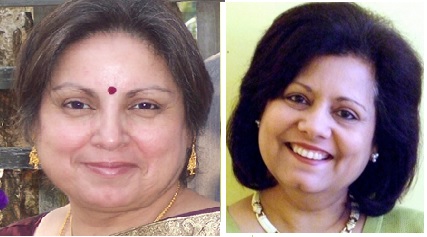On September 14th, Saheli is organizing a all-day Symposium on Mental Health and Emotional Well-Being at Harvard Pilgrim Health Care, 93 Worcester Street, Wellesley, MA. Co-producers Neelam Wali and Kumkum Malik give us insights into this wonderful event.
Could you tell us a little about the emotional well being symposium?
Neelam Wali: For me, this symposium has been a vision in the making for a long time. I used to ask Usha Vakil, President of Saheli, why we could not create a group to discuss family issues and warning signs before domestic violence occurs in our families. With Dr. Malik's help, Saheli has been able to bring this needed dialog to our community. We have four panels planned for the day addressing the following topics: Domestic Violence, Precarious Manhood, Motherhood, and Building Teenage Resilience in US culture. The second part of the program is with Eastern Harmony, a flagship program of Harvard Pilgrim Health Care that gives our attendees the opportunity to sample some great activities for balanced mental health. We will have breakout sessions with specialists in Kundalini Yoga, Tai Chi, Hypnotherapy, Acupuncture, Reflexology,Massage Therapy, and Crystal bowls.
Why did Saheli decide to do this symposium?
Neelam Wali: Over the last decade, Saheli Boston has seen a drastic increase in the number of domestic violence cases reported in South Asian homes. On the heels of Boston’s growing technology industry, students and working professionals have immigrated to the Bay State with the promise of economic prosperity. As this generation finds professional success, we must emphasize the importance of balance in their personal lives. Early intervention is the key to a successful resolution. With this goal in mind, the Mental Health Symposium was created with the help of two wonderful organizations: Harvard Pilgrim Health Care and Saheli Boston. Saheli Boston has been providing support to South Asian domestic violence victims for over 17 years, thanks to a dedicated team of volunteers and community members. Recognizing the need for Eastern Harmony as part of their overall healthcare resources, Harvard Pilgrim has graciously provided Saheli Boston with the funding necessary to host this program.
How wide spread are issues like depression in the South Asian community?
Kumkum Malik: We do not have statistics, because the community so far has not been able to talk about these issues: unless we talk, we cannot go to the next step, which is get data that can then be used to devise solutions.
Is depression more prevalent among women?
Kumkum Malik: Yes. Nationally, that is the evidence, and in my work as a clinical psychologist, I have seen no evidence in the South ASian community to suggest that we are dramatically different. Women have double the rate, that is, women are twice as likely as men to have depression through the course of their life, married women are more likely than unmarried women, married women with children are more vulnerable than married women without children, and mothers with three or more children are more vulnerable than mothers eith one child.
Is medication being over prescribed when it comes to depression?
Kumkum Malik: It is not a question of being over prescribed, rather, it is a situation where depression is widespread, but there is a lack of discourse about treatment. Medication is the cheapest treatment, despite evidence again and again about its limitations and side effects. The symposium will allow the audience to experience first hand, free of charge, what some of the other modalities can be.
South Asian families struggle when it comes to children with Mental challenges . What suggestions do you have for people who are faced with this situation?
Kumkum Malik: Having a child with challenges is a journey that is very lonely for South Asian families. The suffering is hard ot describe, and the other siblings as well as the marriage really take a hit. While this is true regardless of ethnicity or race, it is exacerbated for us because of the shame, taboo and silence around it for us. I would respectfully urge such families to understand: you are in the best place in the world for this to happen to your child.
Any words of wisdom for people who may be struggling with emotional issues?
Neelam Wali: Simply that, as a member of this community, do not be afraid to speak up or wait too long to seek help. Talk to your friends, family, and loved ones about what is going on. We are lucky enough to live in a place where help is just a phone call away. And most importantly, realize that you are a part of a whole - whether that whole is a relationship, a family, or a community. When we are individually healthy, we are healthy as a whole. That is a goal that we all can agree, would be wonderful to achieve.Seek out the resources. They are as close as asking your peaditrician, or a google search.
Kumkum Malik: You are not alone. In my career of over 30 years, I have come to have the utmost respect for my clients. They are the brave and courageous ones among us: they dare to take the problem by the horns, so to speak, and tackle it. So again, I would say with utmost respect, Face the fear, and move forward with empowerment.

